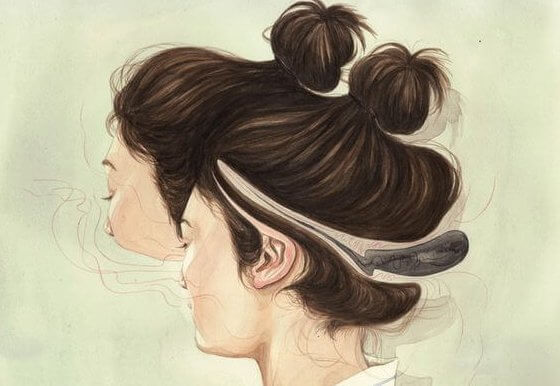Do You Love Yourself? 5 Signs That Point to No


Reviewed and approved by the psychologist Sergio De Dios González
But if you don’t love yourself, you won’t just have a hard time connecting with other people, it will also increase your risk of depression.
You can learn to detect signs that point to you not loving yourself as much as you should. Doing so can help improve the way you connect with yourself (inner dialogue) and with others.
Identifying these signs can also help you find a way out of sadness or disappointment. It can even help you take charge when you feel yourself in a low mood.
You Question What Other People Say or Do For You
Here’s one indicator of low self-esteem that’s often behind these negative thoughts about yourself. What it means is questioning the feelings, words, and actions of other people towards you. You don’t really believe what everyone does, says, or feels about you.

There’s no doubt we’d all like to feel loved and understood. But people with low self-esteem tend to overvalue what other people say and do, and question it constantly.
They think nobody loves them or values them. They take criticism very personally. And, what’s worse, they think there’s always an ulterior motive when anyone does express appreciation.
That makes sense. There’s a very consistent unconscious thought behind it. How can another person love me more than I love myself?
How can someone respect me more than I respect myself? How can someone be more friendly towards me than I am with myself?
You’re Always on the Defensive
Always being on the defensive is another clear sign you don’t love yourself as much as you should. Insecurity and lack of self-trust will keep you constantly on the alert for no good reason.
And it doesn’t just up your stress levels. It also stops you from being objective about the things going on around you.
Being on the defensive like this stops you from clearly understanding what people tell you or ask you. And it makes you feel uncertain about what other people think.
It also creates a state of fear and sadness that doesn’t let you enjoy things. When on the defensive, your attitude towards others can easily turn rude, unpleasant, or tense, if not violent.
Also, always being on the defensive means you’re acting based on worst-case scenarios. Therefore your reaction might be over the top and even inappropriate.
The result is often conflict which may actually end up making your worst fears come true and reaffirming your point of view.
You Try to Avoid Conflict by Pretending Everything is Okay
But another thing that may happen is that you want to avoid a conflict, so, you pretend everything is okay. That is, instead of standing up for fairness or advocating for yourself, you choose to give up for the sake of avoiding problems.
The problem is that your lack of self-esteem and self-love won’t give you the strength to defend yourself. On the other hand, you’ll easily start an argument over something pointless or something that isn’t really important to you.
You’re afraid other people will get angry or disregard you for defending your opinion. This will make it so you accept what they say or agree so that they’ll be satisfied.
And what happens in that process is that you feel even more that your opinion doesn’t matter. That no one cares about what you want.
You Compare Yourself to Others, Even Though There’s Nothing to Compare
The habit of comparing yourself with others is another clear sign you don’t love yourself. In reality, comparing ourselves with other people isn’t automatically negative.
The problem is that people who don’t love themselves go too far with the comparison. This is especially true with their looks.
In fact, a person who doesn’t love themselves will even compare where there’s nothing to compare. Then, they wallow in the outcome of the comparison.
As a result, not only does their self-esteem go down, but then they get feelings of envy or abandonment, or even of being the victim of injustice. This all just works to undermine self-love even more.

You See Your Achievements as Just Good Luck. Love Yourself and Your Accomplishments!
It’s true that a lot of the things we achieve might have come from a bit of good luck. But not everything is a matter of luck. You need to know how to take advantage of opportunities to turn that bit of luck into an something.
But if you don’t love yourself enough, you won’t be able to recognize the value of what you’ve accomplished. That’s exactly why you don’t value your abilities or your efforts.
So of course you don’t see other people as being able to value them, and you don’t understand their congratulations or praise. In a way, that attitude of giving luck the credit for your achievements will make you feel incompetent and unmotivated — directionless.
Believe in yourself, don’t be toxic to yourself. Fall in love with yourself and everything around you will change.
All cited sources were thoroughly reviewed by our team to ensure their quality, reliability, currency, and validity. The bibliography of this article was considered reliable and of academic or scientific accuracy.
- Bergagna, E. & Tartaglia, S. (2018). Self-esteem, social comparison, and Facebook use. Europe’s journal of psychology, 14(4), 831-845. https://www.ncbi.nlm.nih.gov/pmc/articles/PMC6266525/
- Harris, M. A., & Orth, U. (2020). The link between self-esteem and social relationships: A meta-analysis of longitudinal studies. Journal of personality and social psychology, 119(6), 1459-1477. https://pubmed.ncbi.nlm.nih.gov/31556680/
- Nguyen, D. T., Wright, E. P., Dedding, C., Pham, T. T., & Bunders, J. (2019). Low self-esteem and its association with anxiety, depression, and suicidal ideation in vietnamese secondary school students: a cross-sectional study. Frontiers in psychiatry, 10(698), 1-7. https://www.ncbi.nlm.nih.gov/pmc/articles/PMC6777005/
- Paz, V., Nicolaisen-Sobesky, E., Collado, E., et al. (2017). Effect of self-esteem on social interactions during the Ultimatum Game. Psychiatry Research, 252, 247-255. https://www.sciencedirect.com/science/article/abs/pii/S016517811631037X
- Vanhalst, J., Luyckx, K., Scholte, R. H., Engels, R. C. & Goossens, L. (2013). Low self-esteem as a risk factor for loneliness in adolescence: Perceived-but not actual-social acceptance as an underlying mechanism. Journal of abnormal child psychology, 41, 1067-1081. https://pubmed.ncbi.nlm.nih.gov/23661185/
- Wood, J. V., Giordano-Beech, M., Taylor, K. L., Michela, J. L., & Gaus, V. (1994). Strategies of social comparison among people with low self-esteem: self-protection and self-enhancement. Journal of personality and social psychology, 67(4), 713-731. https://pubmed.ncbi.nlm.nih.gov/7965616/
- García, G., Belloch, A., & Castañeiras, C., (2010). Áreas en las que Basamos Nuestra Autoestima y su Influencia sobre el Bienestar Emocional: Validación de la escala de contingencias de la autoestima para su uso en castellano Revista Argentina de Clínica Psicológica, vol. XIX, núm. 1, abril, 2010, pp. 5-13. https://www.redalyc.org/pdf/2819/281921797001.pdf
- Cazan, A., & Dumitrescu, A., (2016). EXPLORING THE RELATIONSHIP BETWEEN ADOLESCENTRESILIENCE, SELF-PERCEPTION AND LOCUS OF CONTROL. ROMANIAN JOURNAL OFEXPERIMENTAL APPLIED PSYCHOLOGYRJEAP Vol 7. https://scholar.googleusercontent.com/scholar?q=cache:ccOdbWjmXusJ:scholar.google.com/+self+esteem+control+locus&hl=es&as_sdt=0,5&as_ylo=2014
- León, E., (2019). Procesos de autocrítica : crecimiento y destrucción. Relación de la autocrítica con el perfeccionismo y la autoestima. Universidad Pontificia. https://repositorio.comillas.edu/xmlui/handle/11531/31807
- Carrión, O., Sifuentes, B., (2018). Síndrome de Complacencia en estudiantes universitarios de Psicología. Revista Peruana de Psicología y Trabajo Social, [S.l.], v. 6, n. 2, p. 13-27, oct. http://revistas.uigv.edu.pe/index.php/psicologia/article/view/502
This text is provided for informational purposes only and does not replace consultation with a professional. If in doubt, consult your specialist.








